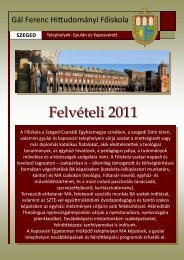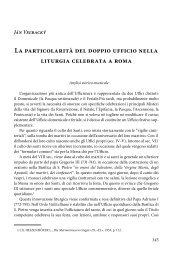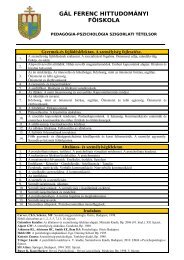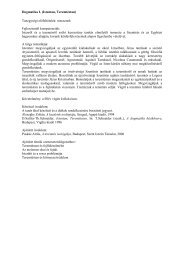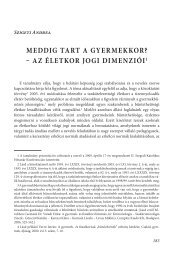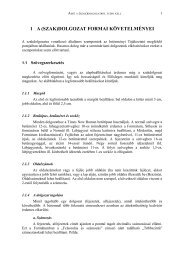Deliberationes - Gál Ferenc Hittudományi Főiskola
Deliberationes - Gál Ferenc Hittudományi Főiskola
Deliberationes - Gál Ferenc Hittudományi Főiskola
You also want an ePaper? Increase the reach of your titles
YUMPU automatically turns print PDFs into web optimized ePapers that Google loves.
abstracts<br />
János Sávai: The Pedagogy of Hope and Social Education<br />
“The future belongs to those who give the next generation reason for hope,” says Pierre<br />
Teilhard de Chardin. The way out, the exodus from the present moral and economic<br />
water-pit is constituted by Christian life, the fruit of hope, which in essence is nothing<br />
more than looking into the future, heading for the future, exploring the unfamiliar;<br />
thus it is a kind of exodus. Christ went in front of us into the secret of absolute future.<br />
The attitude of “waiting for something” is the medium of life, the keynote of being in<br />
which the Christian person becomes acquainted with the proper content of their faith<br />
(Cf. László Boros: We Live from Hope).<br />
The following considerations were born from the education based on Christian faith.<br />
Education for hope is a condition of social education. Hope does not mean craving<br />
for “better days” but action in the present for tomorrow while assuming with honor<br />
yesterday’s failures as well as its successes, from which we have learnt and by which<br />
we have been strengthened. Dedicated education lives within this reality: it does not<br />
keep count only of its expectations but also of its obligations. Hope and social sense are<br />
gradually developing and becoming clearer and clearer. This growth results in tension<br />
and is irremissibly the carrier of a task in education: building an unambiguous system<br />
of values. Christian love does not mean the approbation of any attitude; rather it is the<br />
consistent manifestation of action in truth towards all.<br />
The meaning of Christian hope is not avoidance or “non-doing” but rather an active<br />
and operative life and thus is also what constitutes the educational base for hope. The<br />
base for self-examination and evaluation are constituted by what I have done in thought,<br />
in words, by actions, and what I have failed to do. The command of love in education does<br />
not mean some kind of “propitious kindness” that turns a blind eye to flaws, hides offences<br />
and atones for viciousness instead of guilt. Rather it means that it makes a rule for the<br />
interest of the child or the young and does not strive to gain their liking. An organic part<br />
of this education is setting up certain requirements, the acknowledgement of results,<br />
and confrontation of the young with the consequences of their deeds. A characteristic<br />
feature of this kind of education is education in community, the principle of which in<br />
Christian education can be formulated as follows: in community, by the community, for<br />
the community, with individual responsibilities.<br />
In Christian education, the authenticity of the educator’s example is essential, especially<br />
as it relates to moral education. Hope, in the Christian interpretation, always roots in<br />
the Truth, who is a Person and not an ideology; i.e. God. This anticipation motivates<br />
an attitude that does not alienate the person either from their own reality or from the<br />
community in which they live. According to the “instruction sheet” they “rule the whole<br />
world” – in the most noble meaning of the word. This means that they look after it,<br />
guard it with responsibility and enrich it; make use of it together with others but do<br />
265




